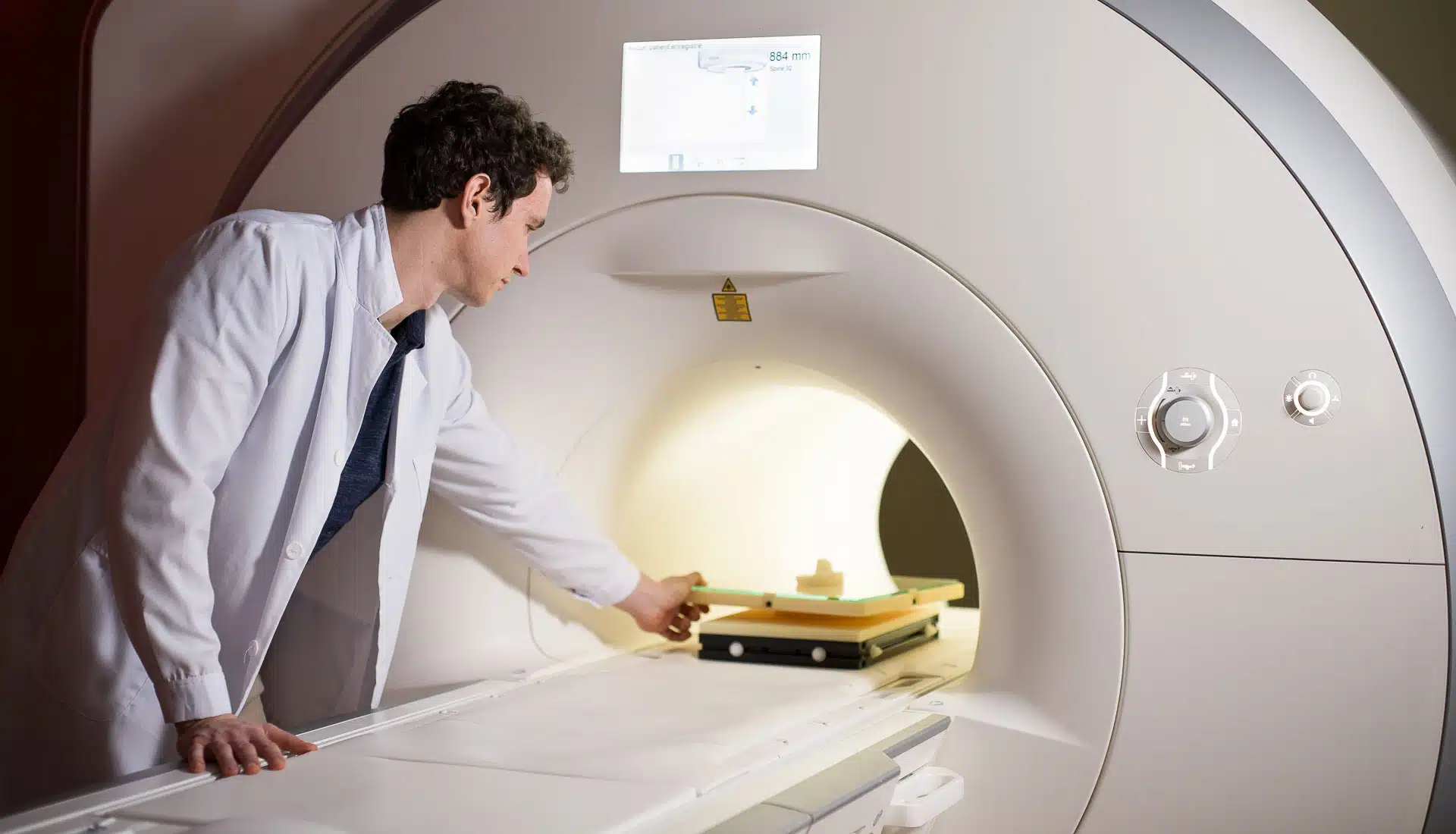MRI testing to assess the MRI safety and compatibility of your products
We offer a wide range of tests for evaluating the safety of medical devices in the MRI environment, here is a non-exhaustive list:
- ASTM tests
- ASTM F2052 Measurement of the displacement force generated by the static magnetic field
- ASTM F2213 Measurement of the torque generated by the static magnetic field
- ASTM F2182 Measurement of the Radio Frequency induced heating
- ASTM F2119 Evaluation of the image artifacts generated by the presence of the device
- ISO / TS 10974
- Clause 8 Assessment of radiofrequency heating
- Clause 9 Assessment of gradient field heating
- Clause 10 Evaluation of vibrations
- Clause 11 Measurement of the displacement force induced by the static magnetic field
- Clause 12 Measurement of the magnetic torque induced by the static magnetic field
- Clause 13 Assessment of gradient field induced currents
- Clause 14 Assessment of malfunctions due to the static magnetic field
- Clause 15 Assessment of radio frequency induced malfunctions
- Clause 16 Assessment of gradient field induced malfunctions
- Clause 17 Assessment of the combined field effects (possibility to monitor implant activity)
- Clause 18 Evaluation of the image artifacts generated by the presence of the device
- Other tests
- Measurement of magnet demagnetization according to AAMI CI86
- Extraction of the magnet from a cochlear implant according to AAMI CI86
- Specific test methods defined in ISO14708 and AAMI PC76
Each device is unique, and our expertise allows us to adapt to most situations. We design and carry out tailor-made tests to meet any particular demand, especially when the normative methods are not directly applicable (non-implantable devices for example). So contact us to discuss your project.
Why choose Healtis?
Quality commitment
Our quality policy allows us to guarantee the reliability of our test results and the conformity of our practices with the normative requirements.
HEALTIS is ISO/IEC 17025 accredited (accreditation N° 1-6320, scope available on www.cofrac.fr).
Benefit from our support!
You will be in touch with one of our experts from the first contact. They will communicate with you all of the necessary information to understand the basis of MRI Safety assessment for medical devices and the relevant regulatory framework. They will take into account your needs to bring you an adapted response to your inquiry.
Attend Testing In person!
Throughout the realization of your project we guarantee a clear communication and strong support. You will have all the information you need to understand our work and if you wish, may attend the realization of your tests.
Healtis Gives you confidence in your testing strategy
Where necessary, our numerical simulations and technical and regulatory assistance activities will assist you in defining a relevant risk assessment strategy, identifying and justifying the worst cases, interpreting test results, and ensuring the labeling of your products according to ASTM F2503, FDA Guidance “Testing and Labeling Medical Devices for Safety in the Magnetic Resonance (MR) Environment” and the relevant literature.
To learn more about the safety and compatibility of medicals devices in MRI, you also have the opportunity to participate in our MRI safety training courses.
What does the MRI testing workflow look like?
The typical MRI safety and compatibility assessment study will look something like this:
Risk analysis: The first step of any MRI testing activity should be a detailed risk analysis. This involves both determining the possible risks to the patient, but also identifying any possible malfunction that can be induced. This step also involves drafting the strategy for project. Certain risks can be accessed via different methods or may be treated via scientific arguments with written rationale. So at this stage, determining the most adapted strategy to assess the device is key.
Testing / Rationale Writing: The second step is to either perform device testing or draft scientific arguments via a written rationale to address all the possible risks and malfunctions identified in step 1. At this stage, just prior to testing, for multiconfigurational devices, worst-cases are identified. Any simulations that are necessary to identify worst-case are performed, often in parallel to other device testing. At this step all test reports or rationales are objective and independent.
Labeling: In this third and final step, all test results and rationales are analysed, and based on the totality of the results an MRI label is determined. In almost all cases, the label will be an MRI Conditional label. During this phase, the conditions for which the device can be introduced in the MRI environment are determined.
On average, how long should an MRI study take?
The entire MRI safety and compatibility assessment workflow can take as little as 3-4 weeks to complete, and as long as 3-4 months depending on the complexity of the project. Typically, wholly implanted passive medical devices are on the order of 3-4 weeks while active implantable medical devices (AIMD) are on the order of 3-4 months. Often, the timeline is influenced by the ability of the device manufacturer to supply CAD for numerical simulations or test objects for testing.
How many devices do I need to supply for testing?
The number of samples required for a test campaign depends on the characteristics of the medical device. It is sometimes possible to carry out several tests on the same sample, particularly if the first tests have had no influence on the sample’s physical properties, especially its electrical and magnetic properties. It is generally preferable to have one sample for each test.
How are tests performed?
Your tests will be performed on clinical MRIs, by qualified engineers, PhDs or test technicians.
Our instruments are selected or designed by our team of experts to meet all the constraints of the MRI environment and the normative requirements. All instruments are qualified, calibrated and regularly monitored.
We additionally have available a probe for measuring signals during an MRI exam; this allows, for example, to monitor the activity of an active implant in the MRI environment during an MRI exam (pacemaker, neurostimulator, etc.)
Does Healtis have experience testing my particular type of device?
For more than 10 years, HEALTIS has performed safety and MRI compatibility tests on a large number of implantable and non-implantable devices. Which, for the most part, have been introduced to the US, European, or Asian markets. More than 500 trials have already been conducted in our laboratory for clients from all backgrounds and a variety of devices. Here are some examples of devices we have tested:
Passive Implantable Devices
- Orthopedic Implants (Trauma, plates, screws, etc.)
- Joint prostheses (hip, knee, shoulder, finger, etc.)
- Spinal implants (Fixation, cages, etc.)
- Stents
- Catheters
- Valves
- Implantable chambers
- Dental Implants
- Maxillofacial implants
- Cranial implants
- Etc.
Active Implantable Devices
- Heart valves
- Neurostimulators
- Cochlear / Bone conduction implants
- Pacemakers, implantable defibrillators
- Ocular
- Etc.
Semi-Implantable Devices
- Intracranial pressure sensors
- Suture anchors
- External Fixation
- Intracerebral electrodes (SEEG)
- Etc.
Non-Implantable Devices
- Monitoring devices
- RFID Tags
- Gas bottle and regulators
- Patient supports
- Flowmeters
- Medical gas cylinders and regulators
- Etc.


